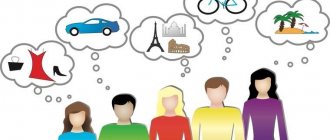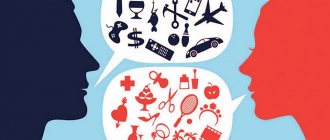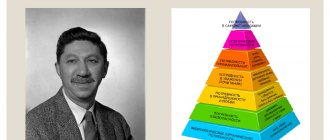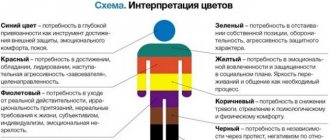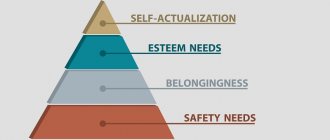Social, spiritual and material needs
The needs are so diverse that there are many classifications of them. In classical science, it is customary to distinguish 3 groups of needs: social, spiritual and material. The first place is given to material satisfaction: in clothing, housing, water, food. The means by which needs are satisfied are called material goods. These can be essential or luxury items, as well as services (consultations with a lawyer, doctor, car repair, etc.).
Spiritual needs are associated with the need for the development of the individual as a personality. They are satisfied by obtaining an education, reading books, engaging in art, and possessing information.
Through the participation of people in public and collective activities, socio-economic needs are realized: in trade unions, parties, public foundations, creative circles, and charitable organizations.
Let's sum it up
The social significance of any association of people is determined by which groups of needs it satisfies in the first place (material, spiritual, social), what goals it pursues, what forms and methods of activity it chooses. Unfortunately, they do not always meet the interests of society and the state and can be antisocial in nature. Therefore, internal and external control of a social group is necessary, in whatever form it may exist.
Its leadership and ordinary members must be fully aware of the responsibility for the results of their work. Basic groups of people's needs should not be satisfied through socially disapproved or criminally punishable actions.
Other classifications of needs
There are other divisions. For example, according to the types of subjects of needs, they are divided into public, collective, family and individual. Representatives of neoclassical science in economics (for example, A. Marshall, an English economist) divided them into relative and absolute, lower and higher, urgent and those that can be postponed, indirect and direct. Needs are also identified by sphere of action: communication, labor, recreation (restoration of working capacity, rest) and economic needs. Let's take a closer look at the last type.
Economic needs are part of human needs, for the satisfaction of which there must be production, exchange, distribution and consumption of services and goods. It is this type of need that is involved in the interaction between unsatisfied demands and production.
Maslow's theory
The theory of A. Maslow, an American sociologist (his photo is presented below), has gained great popularity in modern Western literature. All needs, in accordance with this classification, can be arranged in the form of a pyramid, in ascending order from material (“lower”) needs to spiritual (“highest”) needs.
The following types are distinguished:
- physiological needs (drinking, eating, etc.);
- safe (protected from fear, anger and pain, etc.);
- in social connections (friendships, family, religious);
- in acquiring social status (approval, recognition);
- in self-expression (realization of personality abilities).
This classification can be presented in the form of a pyramid, at the top of which there will be needs for self-expression, and at the base - physiological. Lower order needs, according to Maslow, are physiological and safety needs, and higher order needs are for social status and self-expression. Higher needs do not arise until the lower ones are satisfied.
Concept
Human social needs indicate that an individual cannot live alone. He craves love, friendship, and other positive feelings that appear when two or more people communicate.
Unfulfilled social needs do not lead to death, but can seriously reduce the quality of life. Therefore, it is necessary to think about how to implement them.
By the term “social needs,” psychologists understand this type of need that is satisfied not only by communication
It is important for an individual to receive assessment of his activities and feedback from other people
This happens because a person is not only a unit of a biological species. His psyche is represented by a complex and multicomponent mechanism, which differs from that of an animal.
The individual wants to do something meaningful for the group that will give him recognition and praise. If he once received this, he strives to repeat the experience. It is the need for positive emotions that serves as the impetus for carrying out useful activities.
Psychologists believe that it is social needs that can contribute to the development of an individual’s personal sphere. It includes a person’s actions, his motivation, peculiarities of information perception, etc.
Psychologists are sure that it is social needs that force an individual to act actively. To gain recognition, he works and participates in public life.
For a full-fledged existence, a person needs to satisfy two groups of needs. The first is the need for food, drink, rest, etc. The second is the need for communication and recognition.
Interrelation and interdependence of needs
You can supplement the classification of needs by highlighting the following types: irrational and rational, concrete and abstract, unconscious and conscious, etc. But it should be remembered that any classification is quite conditional, since economic needs of one type or another are interdependent and interconnected. The material needs of people appear not only under the influence of the vital functions of the human body, but also to a significant extent under the influence of scientific, technical and economic development of society, social and spiritual guidelines. And the social, intellectual and spiritual needs specific to any social stratum and individual person arise under the influence of material ones. They largely depend on the degree of satisfaction of the latter.
Ways to satisfy modern man
The definition of social needs has changed as the world has evolved. In current conditions, people are increasingly excluded from society. The Internet, social networks, gadgets - all this leads to the fact that individuals have little face-to-face contact.
Important! It is impossible to clearly name effective ways to satisfy needs, since they are different for each person. There are general recommendations that will allow you to realize a social need
The individual organizes his own activities, so he must communicate, make contact, meet other people and take initiative
There are general recommendations that will allow you to realize a social need. The individual organizes his own activities, so he must communicate, make contact, meet other people and take initiative.
The ability to conduct conversations does not appear with the birth of a person. Social skills are trained through practice. You need to constantly communicate and get to know each other.
Another way is to learn new things. Meetings, seminars, training courses - all this allows you not only to gain knowledge, but also to acquire new social connections.
A person must understand who he is. To do this, he needs to devote time to reflection. Such self-analysis allows you to get an idea of your pros and cons. Self-esteem appears only in self-confident people.
Historical nature and dynamism of needs
The economic needs of society are historical in nature. The methods of satisfying them and their extent depend on the life demands and habits with which society as a whole, social strata and individual people were formed, that is, in what socio-historical conditions they find themselves. The economic needs of society are dynamic. Social progress, human improvement, intensity of information exchange - these are the factors under the influence of which requests change.
Continuous changes in the qualitative and quantitative ratio that economic needs and benefits undergo, a steady increase in the process of evolutionary development of society, is the law of increasing needs. Their change occurred at a relatively low rate, smoothly over many centuries and millennia. Today, the rate at which economic needs and goods are growing has accelerated significantly. At the same time, there is a social uniformity in their rise, and the emergence of needs of a higher order among ever larger masses of the population.
A need is not just a desire, it is a need. And the need cannot be satisfied
Even if you don't find a toilet, you still have to do “this”. Therefore, if the need is not directly recognized and satisfied, it is satisfied indirectly, bypassing awareness. The most popular way to get support and love is to get sick. And with the help of a serious illness you can gain more respect and recognition. This is not about simulation. People get very seriously ill, without even realizing that all they want is to get the attention, care and respect of loved ones. When there is no opportunity to recognize your needs and take responsibility for meeting them, then this responsibility is transferred to the body. And psychosomatics becomes a common solution. When realizing (not denying) the need, a clear chain is built:
When one logically follows from the other. That’s why it’s so important in coaching, for example, to trace where the goal came from.
What need does a person realize in this way? Why is it important? Was the target taken from the ceiling? Will a person go to her, will he understand why?
Features and classification of economic goods
They must be produced before they are used. Therefore, the ultimate goal of the production activity of any society and the basis of its life is precisely the creation of this kind of goods. Economic needs and resources, as well as various benefits, have a rather complex classification. Benefits are divided, depending on the criterion underlying them, into several groups.
- Long-term, which involve repeated use (book, car, videos, electrical appliances, etc.) and short-term, which disappear after a single use (matches, drinks, meat, bread, etc.).
- Substitutes (interchangeable) and complementary (mutually complementary). Not only production resources and consumer goods are classified as substitutes, but also transport services (car-plane-train), leisure services (circus-theater-cinema), etc. Speaking about complementary goods, we can cite as examples a chair and a table, a pen and paper, a car and gasoline, which, complementing each other, satisfy human economic needs.
- Present goods that are at the disposal of one or another economic entity, and future ones (their creation is only expected).
- Intangible and tangible.
- Private and public.
- Indirect and direct.
- Means of production and consumer goods.
Material and intangible benefits
The development of economic needs occurs in the direction of increasing consumption of material and intangible goods. The first are the result of the functioning of one or another material production (construction, agriculture, industry, etc.). These are clothing, food, cars, buildings, household appliances, sporting goods, etc.
The second (intangible benefits) exist in the form of activities: treatment, training, communal, household or transport services for the population, etc. Intangible goods are fundamentally different from material ones in that the consumption of the latter is always preceded by the process of their creation. Both in space and in time these two processes are separated. Unlike goods, the production of services at the same time acts as their consumption, that is, as a rule, there is no time gap.
Public goods
Public goods are those goods that are in collective, common consumption. For example, public order, national defense, street lighting, etc. Non-excludability from consumption and indiscriminateness are the distinctive features of this type of benefit.
Indiscriminateness means that such goods cannot be provided to an individual without simultaneously satisfying the needs of other people. Non-excludability means indivisibility, that is, consumers who have not paid for their production cannot be excluded from using them. The state, acting as the producer of these goods, granting the right to non-payers to use them, uses special methods of influencing them. Producers of private goods behave differently.
Satisfying the need for self-realization in the profession
Personal expression plays an important role today. High demands are placed on a person for two reasons:
- Competition in the labor market.
- Difficult life circumstances.
Satisfaction of the need for self-realization is expressed externally and internally. External manifestation implies achievements, for example, receiving a promotion, an increase in wages, respect from colleagues. Internal self-realization is the development of useful qualities, gaining knowledge and improving skills.
This type of self-realization is characterized by continuity, creativity, setting and achieving goals. Here you can add the disclosure of personal potential, recognition from people engaged in a similar type of activity and other things.
Self-realization in the profession is strongly influenced by personal traits, for example, flexibility of thinking and behavior, ability to organize, communication skills, and the ability to work in a team.
Indirect and direct benefits
When characterizing benefits, a distinction is also made between indirect and direct. Direct - those that directly enter human consumption, and indirect, in contrast, indirectly. Economic goods are therefore classified as means of production and goods of consumption. The latter are used for home, family, personal and other types of public consumption. Various means of labor created by people and subsequently used in their work activities (instruments, instruments, structures, buildings, equipment, machines) and objects of labor (energy, materials) are means of production.
Now you know what social benefits and economic needs are. The economy today is actively developing and begins to produce increasingly better goods. However, new needs arise. It is probably impossible to satisfy them completely. Society's demands are constantly growing, and what was a luxury for one generation is already everyday life for another.



